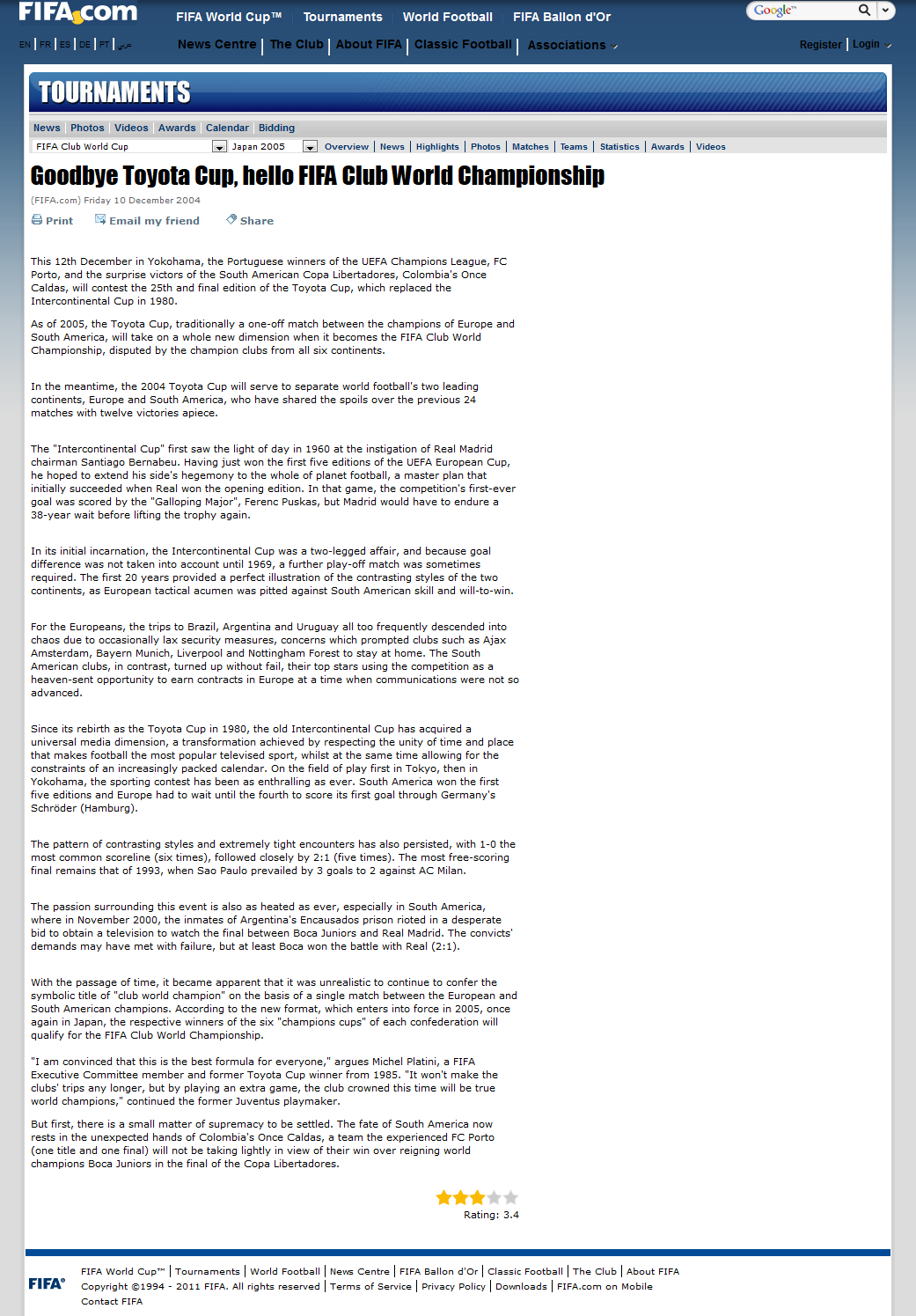|
Goodbye Toyota Cup, hello FIFA Club World Championship
(FIFA.com) Friday 10 December 2004

This 12th December in Yokohama, the Portuguese winners of the UEFA Champions League, FC Porto, and the surprise victors of the South American Copa Libertadores, Colombia's Once Caldas, will contest the 25th and final edition of the Toyota Cup, which replaced the Intercontinental Cup in 1980.
As of 2005, the Toyota Cup, traditionally a one-off match between the champions of Europe and South America, will take on a whole new dimension when it becomes the FIFA Club World Championship, disputed by the champion clubs from all six continents.
In the meantime, the 2004 Toyota Cup will serve to separate world football's two leading continents, Europe and South America, who have shared the spoils over the previous 24 matches with twelve victories apiece.
The "Intercontinental Cup" first saw the light of day in 1960 at the instigation of Real Madrid chairman Santiago Bernabeu. Having just won the first five editions of the UEFA European Cup, he hoped to extend his side's hegemony to the whole of planet football, a master plan that initially succeeded when Real won the opening edition. In that game, the competition's first-ever goal was scored by the "Galloping Major", Ferenc Puskas, but Madrid would have to endure a 38-year wait before lifting the trophy again.
In its initial incarnation, the Intercontinental Cup was a two-legged affair, and because goal difference was not taken into account until 1969, a further play-off match was sometimes required. The first 20 years provided a perfect illustration of the contrasting styles of the two continents, as European tactical acumen was pitted against South American skill and will-to-win.
For the Europeans, the trips to Brazil, Argentina and Uruguay all too frequently descended into chaos due to occasionally lax security measures, concerns which prompted clubs such as Ajax Amsterdam, Bayern Munich, Liverpool and Nottingham Forest to stay at home. The South American clubs, in contrast, turned up without fail, their top stars using the competition as a heaven-sent opportunity to earn contracts in Europe at a time when communications were not so advanced.
Since its rebirth as the Toyota Cup in 1980, the old Intercontinental Cup has acquired a universal media dimension, a transformation achieved by respecting the unity of time and place that makes football the most popular televised sport, whilst at the same time allowing for the constraints of an increasingly packed calendar. On the field of play first in Tokyo, then in Yokohama, the sporting contest has been as enthralling as ever. South America won the first five editions and Europe had to wait until the fourth to score its first goal through Germany's Schröder (Hamburg).
The pattern of contrasting styles and extremely tight encounters has also persisted, with 1-0 the most common scoreline (six times), followed closely by 2:1 (five times). The most free-scoring final remains that of 1993, when Sao Paulo prevailed by 3 goals to 2 against AC Milan.
The passion surrounding this event is also as heated as ever, especially in South America, where in November 2000, the inmates of Argentina's Encausados prison rioted in a desperate bid to obtain a television to watch the final between Boca Juniors and Real Madrid. The convicts' demands may have met with failure, but at least Boca won the battle with Real (2:1).
With the passage of time, it became apparent that it was unrealistic to continue to confer the symbolic title of "club world champion" on the basis of a single match between the European and South American champions. According to the new format, which enters into force in 2005, once again in Japan, the respective winners of the six "champions cups" of each confederation will qualify for the FIFA Club World Championship.
"I am convinced that this is the best formula for everyone," argues Michel Platini, a FIFA Executive Committee member and former Toyota Cup winner from 1985. "It won't make the clubs' trips any longer, but by playing an extra game, the club crowned this time will be true world champions," continued the former Juventus playmaker.
But first, there is a small matter of supremacy to be settled. The fate of South America now rests in the unexpected hands of Colombia's Once Caldas, a team the experienced FC Porto (one title and one final) will not be taking lightly in view of their win over reigning world champions Boca Juniors in the final of the Copa Libertadores.
Imagem: Felipe
Virolli / RankingDeClubes.com.br

Reprodução do site da FIFA (link
original).

 Voltar
para a história da Copa do Mundo de Clubes da FIFA
Voltar
para a história da Copa do Mundo de Clubes da FIFA

|